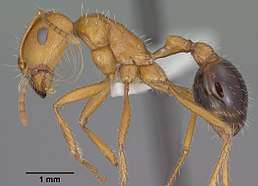Pogonomyrmex californicus
Pogonomyrmex californicus, or California harvester ant,[1] is a species of ant in the subfamily Myrmicinae. It is native to North America, where it occurs in the southwestern United States and northern Mexico. It is best known as the ant that is sent out for Uncle Milton's Ant Farm.[3]
| Pogonomyrmex californicus | |
|---|---|
 | |
| P. californicus worker from Arizona | |
| Scientific classification | |
| Kingdom: | |
| Phylum: | |
| Class: | |
| Order: | |
| Family: | |
| Subfamily: | |
| Tribe: | |
| Genus: | |
| Species: | P. californicus |
| Binomial name | |
| Pogonomyrmex californicus Cole, 1968 | |
Biology
Pogonomyrmex californicus can be found in open, warm, and sandy areas. Typically, it forages during the day as individuals or in a group, forming columns as they work. It preys on arthropods, such as the larvae of the raisin moth (Cadra figulilella), and collects seeds. It can form colonies of hundreds of individuals. The nest entrances are often irregular and are surrounded by loose sand arranged in a circular or semi-circular pattern. Reproduction occurs around July, when reproducing individuals are present.
Polygynous colonies
Pogonomyrmex californicus forms multiple-queen colonies at times. Most colonies are founded and sustained by one queen, but one population has been noted to contain multiple queens in a cooperative, a phenomenon known as pleometrosis.
Range
The distribution of this ant extends from Texas to Utah to Baja California, Sonora, and Chihuahua.
References
- A Dictionary of Entomology. CABI. 2011. p. 244. ISBN 978-1-84593-542-9.
- Hevesi, D. (January 29, 2011). "Milton M. Levine, 97, Inventor of Ant Farm, Dies". The New York Times. Retrieved 31 January 2011.
External links
